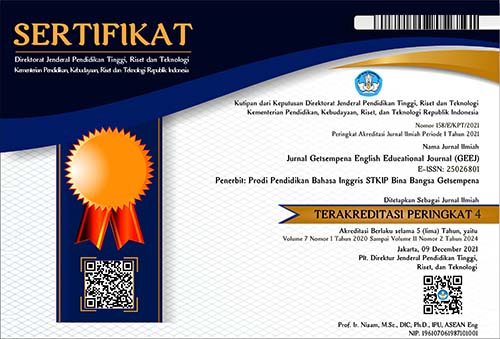THE TEACHER’S AND STUDENTS’ PERCEPTION ON PROJECT BASED LEARNING IN NURSING DEPARTMENT
Abstract
The study was aimed at investigating the students’ and teacher’s perceptions in utilizing technology-based classroom instruction in learning English for specific purpose (ESP) as an effort of enhancing the quality of students’ participation. In education, active participation of all stakeholders such as students, teachers, and policy makers is important so that the education goals can be achieved. The development of industrial revolution 4.0 disrupts every aspect of life including education. Teacher should take advantage of the current technology development for enhancing the quality of teaching process. The study employed survey study research method. One teacher and 72 students from nursing department were involved in the study and an electronic questionnaire with close-ended and open-ended questions was used to collect the data. The data was analyzed with the stages of data collection, data reduction, data display and conclusion drawing. The findings of the study showed that both the teacher and the students have perceived positively towards the project based learning in their ESP class. In addition, this type of learning process enhances students’ active participation
References
Al-Kathiri, F. (2015). Beyond the Classroom Walls: Edmodo in Saudi Secondary School EFL Instruction, Attitudes and Challenges. English Language Teaching, 8(1), 189-204.
Al-Naibi, I. H., Al-Jabri, M., & Al-Kalbani, I. (2018).Promoting Students' Paragraph Writing Using EDMODO: An Action Research. Turkish Online Journal of Educational Technology-TOJET, 17(1), 130-143.
Belcher, D. D. (2006). English for specific purposes: Teaching to perceived needs and imagined futures in worlds of work, study, and everyday life. TESOL quarterly, 40(1), 133-156.
Bell, S. (2010). Project-based learning for the 21st century: Skills for the future. The clearing house, 83(2), 39-43.
Cao, Yunsheng. (2012). Cultivation of Autonomous Learning Ability-EssentialRequirement for CollegeStudents.Proceedings of the International Conferenceon Information Engineering and Applications (IEA) 2012, Lecture Notes in Electrical Engineering 217, DOI: 10.1007/978-1-4471-4850-0_2
Garrison, D. R. (2011). E-learning in the 21st century: A framework for research and practice. Routledge.
Gleason, N. W. (Ed.). (2018). Higher education in the era of the fourth industrial revolution. Palgrave Macmillan.
Godwin-Jones, R. (2011). Mobile apps for language learning. Language Learning & Technology, 15(2), 2-11.
Halim, A, & Latipah, A.J. (2018). The Evaluation of Web-based English Language Learning Media for Nursing Students. International Journal of Engineering & Technology. Volume 8 special issue 1 pp 123-128.
Halim, A., Khatimah, K., Rachman, D., Lubis, A. A., Sunarti, S., & Puspita, R. H. (2019). Exploring EFL Students’ Experiences on Online-Based Writing Portfolio. ACITYA Journal of Teaching & Education, 1(1), 1-9.
Hashim, Muhammad., & Hameed, Fazal. (2012).Human Resource Management in 21st Century: Issues & Challenges & Possible Solutions to Attain Competitiveness. International Journal of Academic Research in Business and Social Sciences, Vol. 2, No. 9.Pp 44-52.
Hugerat, M. (2016). How teaching science using project-based learning strategies affects the classroom learning environment. Learning Environments Research, 19(3), 383-395.
Lee, L. (2016). Autonomous learning through task-based instruction in fully online language courses.Language Learning & Technology.
Liliia, K., & Gulnara, G. (2016). Mobile technologies in teaching English as a foreign language in higher education: a case study of using mobile application Instagram. In Proceedings 9th International Conference of Education, Research, and Innovation (pp. 6155-6161).
Manasijević, D., Živković, D., Arsić, S., &Milošević, I. (2016).Exploring students’ purposes of usage and educational usage of Facebook. Computers in Human Behavior, 60, 441-450.
Manca, S., &Ranieri, M. (2016).Facebook and the others.Potentials and obstacles of social media for teaching in higher education. Computers & Education, 95, 216-230.
Mason, J. (2002). Qualitative Researching. London: Sage Publication, Ltd.
Masriani, E., Mukhayar, M., & Wahyuni, D. (2018). Writing Anxiety and Writing Strategies Used by English Department Students of Universitas Negeri Padang. Lingua Didaktika: Jurnal Bahasa dan Pembelajaran Bahasa 12 (1), 76-85.
Mori, K., &Ractliffe, L. (2016, April).Evaluating the use of a MOOC within higher education professional development training. In Proceedings of the 25th International Conference Companion on World Wide Web (pp. 831-833).International World Wide Web Conferences Steering Committee.
Ng, B. D., &Wiemer-Hastings, P. (2005).Addiction to the internet and online gaming.Cyberpsychology & behavior, 8(2), 110-113.
Poore, M. (2015).Using social media in the classroom: A best practice guide.Sage.
Priyatno, A. (2017). Promoting learner autonomy through schoology m-learning platform in an EAP class at an Indonesian University.Teaching English with Technology, 17(2), 55-76.
Puspita, H., & Lubis, A. A. (2019). Exploring The 21st Century Skills in Students’ Attitude towards Project Based Learning. In International Seminar and Annual Meeting BKS-PTN Wilayah Barat (Vol. 1, No. 1).
Rotherham , Andrew J., Willingham , Daniel. (2009) 21st Century Skills: The Challenges Ahead. Educational Leadership volume 67 issue 1 pp 16-21
Suana, W., Maharta, N., Nyeneng, I. D., &Wahyuni, S. (2017). Design and implementation of schoology-based blended learning media for basic physics I course. Jurnal Pendidikan IPA Indonesia, 6(1).
Tassinari, M. G. (2012). Evaluating learner autonomy: A dynamic model with descriptors. Studies in Self-Access Learning Journal, 3(1), 24–40.
Thomas, J. W. (2000). A review of research on project-based learning. Retrieved from https://www.researchgate.net/profile/Nathan_Scott2/publication/238670687_Australasian_Journal_Of_Engineering_Education_Co-Editors/links/0deec53a08c7553c37000000.pdf
Thongmak, M. (2013). Social network system in classroom: Antecedents of edmodo© adoption. Journal of e-Learning and Higher Education, (1), 1-15.
























